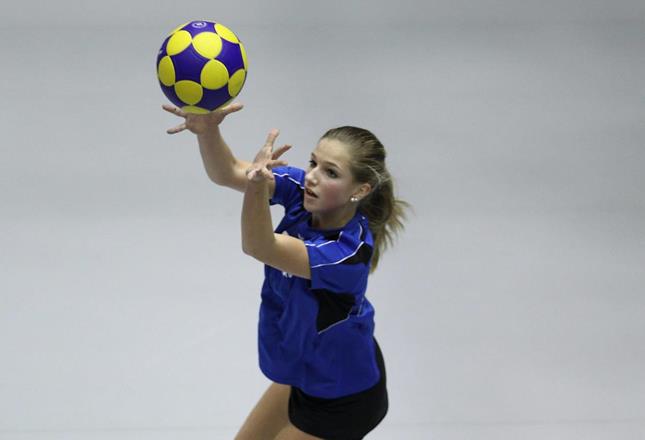
Considered one of the only truly gender-equal sports in the world, korfball is a sport unlike any other and Ellen Pearce, Chair of England Korfball, is here to tell you everything you need to know.
How would you describe korfball?
Korfball is a dynamic, fast-paced team sport, played in mixed gender teams. Developed at around the same time, it has similarities with basketball and netball but uniquely it is specifically designed for men and women to play together.
What are the basic rules?
Each team has 8 players, 4 men and 4 women, divided into an attacking division and a defending division. Each half (attacking and defending) of the court has a ‘korf’ or basket which is 3.5m high with no back board. Play can move all around the korf.
In attack, the aim is to score by shooting the ball through the korf.
In defence, the aim is to stop the opposing team from scoring and return the ball to the attacking division.
After 2 goals are scored, the attack and defence switch roles.
Women defend women and men defend men. An attacker is ‘defended’ when the defender is closer to the korf, facing the attacker and actively blocking the shot. Taking a shot while ‘defended’ is not allowed and the ball is given to the other team.
Other rules include no running with the ball, no dribbling the ball, no touching the ball with the foot, no uncontrolled physical contact, no shooting while defended and no marking someone of the opposite gender.
What are the physical and mental health benefits of your sport?
Recent research conducted by Leeds Beckett University has revealed the life-affirming benefits of korfball, particularly as a family-friendly, unifying sport.
It suggests that many are attracted to the sport because it is an opportunity to try something new in adulthood and start on an equal footing regardless of sporting experience.
Korfball’s family friendly nature is also recognised for helping to minimise dropout from sports and activities due to career and family commitments, with female participation levels bouncing back to around 50% for players in their 40s and 50s.
The mental health benefits include the camaraderie of men and women being equal members of the team and the ‘sense of belonging’ to the korfball community or family.
What advice would you have for anyone looking to take up the sport?
Find a local club and give it a go! We are used to welcoming adult beginners, so don’t worry about knowing the rules – everyone will be happy to talk ‘korf’ to you and get you involved!
Lots of clubs also have junior sections and its mixed gender element means that many families are able to play together in inter-generational teams!
It’s great fun, very social and can be played at any level from beginner to elite. One of the particularly great things about korfball is that every player needs to both attack and defend, so everyone gets to play every role and the very best teams are the ones where all players are a shooting threat!
Can I take it to a professional level?
Korfball is played in local, regional and national leagues in England with our Grand Finals weekend being played at the Copperbox as the climax of the domestic season each year. Our international squads play at U15, U17, U19, U21 and seniors. If you want to play ‘professionally’ you’d have to qualify for the Dutch national team!
Relive all the excitement from the Grand Final of the 2019 England Korfball Premier League.
How do you see your sport developing in the years ahead?
The advantages of a genuinely mixed gender sport are huge and it’s crucial that we model gender equality in sport as well as raise the profile of women-only sport.
Korfball is popular in primary schools, great for promoting cooperation between the genders, and growing in participation and visibility across the world. New formats, such as Korf4, played end to end with 4 on a team, and beach korfball are also growing in popularity!
(All images by England Korfball)
It is with immense sadness that the Sport and Recreation Alliance learned of Andy Sutch’s passing last week, and we send our deepest condolences to Andy’s family and friends.
Read moreThis afternoon, the Chancellor delivered her Budget speech to Parliament, outlining decisions on tax and spending.
Read moreAhead of the Chancellor’s Budget statement on 26 November, we take a look a look at the key areas to be aware of and the work the Alliance has been doing lobbying on behalf of members.
Read moreJoining the Sport and Recreation Alliance is pretty simple, but worthwhile!
Register now